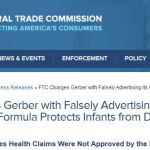If you want to know how not to offend the FDA and FTC sequentially, here’s an instructive lesson about a company that has gotten a big regulatory bruise.  The FTC challenged Gerber’s baby formula claims in court as false and misleading.
The FTC challenged Gerber’s baby formula claims in court as false and misleading.
According to the Bureau of Consumer Protection:
Gerber claimed that Good Start Gentle may prevent or reduce the risk that infants will develop allergies. Ads read “You want him to have your smile, not your allergies” and “I love Mommy’s eyes, not her allergies.” Another ad stated: “If you have allergies in your family, breastfeeding your baby can help reduce their risk. And if you decide to introduce formula, research shows the formula you first provide your baby may make a difference. In the case of Gerber Good Start Gentle Formula, it’s the Comfort Proteins Advantage that is easy to digest and may also deliver protective benefits.”
Labels on the canister said “1st & only routine formula to reduce the risk of developing allergies.”
For parents still weighing the options, Gerber invoked the name of the Food and Drug Administration: “Gerber Good Start is the first and only infant formula that meets the criteria for a FDA Qualified Health Claim.” The company continued to press its case with a gold badge: “1st & Only Meets FDA Qualified Health Claim.”
Persuasive? Yes. Supported by sound science? The FTC says no.
FTC states:
The Federal Trade Commission has charged Gerber Products Co., also doing business as Nestlé Nutrition, with deceptively advertising that feeding its Good Start Gentle formula to infants with a family history of allergies prevents or reduces the risk that they will develop allergies.
The agency also alleges that Gerber has falsely advertised Good Start Gentle’s health claims as FDA-approved. Through its federal court enforcement action, the Commission is seeking to prohibit Gerber from making the alleged false and unsubstantiated allergy-prevention claims.
So what happened?
The short version is that Gerber petitioned FDA in 2005 and 2009 for a qualified health claim (QHC) about a relationship between its whey-based formula and atopic dermatitis.
FDA responded to the petition with an enforcement letter which assessed the evidence, and concluded “that the current scientific evidence is appropriate for consideration of a qualified health claim regarding the relationship between the consumption of 100 percent whey-protein partially hydrolyzed infant formula and a reduced risk of atopic dermatitis, provided that the qualified health claims are appropriately worded so as not to mislead consumers.” However, FDA then concluded that the language proposed by Nestle “is not sufficient to prevent consumers from being misled.” According to FDA, Nestle must “make clear that these formulas should not be fed to infants who are allergic to milk or to infants with existing milk allergy symptoms.” FDA noted that without this qualifying information, FDA would consider the QHC to be misleading.
FDA then provided several possible qualified health claims (QHCs). Each characterized the scientific evidence as insufficient or uncertain to support a claim that the formula reduces risk of atopic dermatitis in infants.
Bizarrely, Nestle/Gerber continued making the claim that its formula reduced the risk of developing allergies, and on top of this, advertised FDA’s enforcement letter as a ‘gold badge’ by FDA and as an approval by FDA that the company was meeting the criteria for a qualified health claim.
As summarized by FTC: “Gerber lacked the scientific substantiation to make these general allergy-prevention claims.”
With any dietary supplement or food claim, it’s important to have several aspects reviewed by FDA legal counsel:
- the claim (be it a structure/function claim, a health claim, a qualified health claim, a nutrient content claim, or otherwise)
- the labeling
- substantiation
Substantiation means that you must have proof for your claim. The level of required proof depends on the claim.
The standard for a health claim is higher than for a structure/function claim. A heath claim characterizes the relationship between a substance and a disease or health-related condition. A health claim must have significant scientific agreement (SSA). A dietary supplement claim need only have “competent and reliable scientific evidence.”
FDA compliance is the first step, but one must also pay attention to FTC compliance. Any false or misleading advertising can trigger FTC enforcement action. In this case, misrepresenting the FDA’s enforcement letter as approval of a claim, created a second layer of enforcement — from FTC.
The bottom line:
- Have your claims and labeling reviewed by FDA legal and regulatory counsel.
- Don’t put your product out to market without FDA and FTC review.
- Be sure your products receive legal review.
- And if you get a letter from FDA, don’t misrepresent FDA’s action to the public.
Stay on the safe side of FDA and FDA compliance by keeping your advertising practices clean.

Contact our healthcare law and FDA attorneys for legal advice relevant to your healthcare venture.
Contact Us


